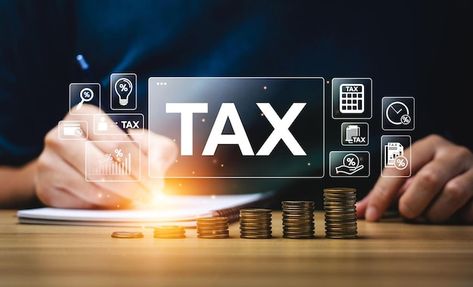Taxes play a crucial role in our society by funding essential public services and infrastructure. From the roads you drive on to the schools and hospitals we rely on.
Taxes ensure the government has the revenue needed to maintain and improve these vital services. This is why understanding the different types of taxes is essential for both individuals and businesses.
In this post, I will break down the main types of taxes in Nigeria, providing a clear guide on what each one entails and how they impact you.
What is Tax and Why Do We Pay it?
Taxes are mandatory financial charges or levies imposed on individuals and businesses by the government.
The purpose of these taxes is to generate revenue for public spending, which funds essential services and infrastructure such as roads, schools, and hospitals. Without taxes, the government would struggle to provide these vital services that we all rely on.

Types of Taxes in Nigeria
1. Personal Income Tax (PIT)
This tax is levied on the income of individuals. This includes salaries, wages, and other forms of personal earnings. The tax rate for Personal Income Tax (PIT) is progressive, meaning it increases as your income increases. It ranges from 7% to 24%, depending on your income level.
For most employees, Personal Income Tax is deducted at source through the Pay-As-You-Earn (PAYE) system, making it relatively straightforward. However, if you’re self-employed, you will need to file your taxes annually, which can be more complex.
2. Company Income Tax (CIT)
Company Income Tax (CIT) is imposed on the profits of companies operating in Nigeria. The standard CIT rate is 30% of taxable profits. However, there is an exemption for small companies with an annual turnover of less than N25 million.
These companies are not required to pay CIT, which can be a significant relief for small businesses. Companies are required to file their returns annually, and payments are typically made in instalments, allowing businesses to manage their cash flow effectively.
3.Value Added Tax (VAT)
Value Added Tax (VAT) is a consumption tax levied on goods and services at each stage of production and distribution. The current VAT rate in Nigeria is 7.5%.
Businesses are responsible for collecting VAT on behalf of the government and must remit it monthly. VAT is included in the price of goods and services, so consumers ultimately bear the cost. This type of tax is crucial for generating revenue from everyday transactions and helps to spread the tax burden more evenly across the population.
4. Capital Gains Tax (CGT)
This tax is charged on the profit made from the sale of capital assets, such as real estate and shares. The rate for CGT is 10%. Both individuals and companies must declare and pay CGT annually.
This tax can be particularly relevant if you’re involved in buying and selling property or investments. It’s important to keep detailed records of your transactions to accurately calculate your capital gains and ensure you comply with the tax laws.
5. Education Tax
Education Tax is levied on the profits of companies and is used to fund education in Nigeria. The rate for education tax is 2% of assessable profits.
This tax is paid alongside CIT and is mandatory for all companies. The revenue generated from Education Tax is used to improve the educational sector, providing better facilities and resources for schools and universities. By paying this tax, companies contribute directly to the development of the country’s education system.
6. Withholding Tax (WHT)
Withholding Tax (WHT) is an advance payment of income tax deducted by your employee from your salary to pay to the government on your behalf at source from payments made to individuals and companies. The rates for WHT vary depending on the type of transaction, ranging from 5% to 10%.
The payer of the income withholds the tax and remits it to the government. WHT serves as a means to collect tax revenue upfront and reduce the risk of tax evasion. It’s commonly applied to payments for contracts, rent, dividends, and professional services.
7. Stamp Duty
Stamp Duty is a tax on legal documents such as contracts, deeds, and securities transactions. The rates for Stamp duty vary based on the type and value of the document.
This tax is usually paid at the point of transaction or when the document is executed. Stamp duty helps to formalize legal documents and transactions, providing a source of revenue for the government. It’s important to ensure that all relevant documents are stamped to avoid legal issues and penalties.
8. Excise Duties
Excise duties are taxes levied on specific goods produced or manufactured within a country. They are usually imposed on goods that are considered luxuries or sin goods, such as; Alcohol, tobacco products, fuel, automobiles, and cosmetics
FAQs
What is the Penalty for Late Tax Payments in Nigeria?
The penalty for late payment of taxes varies depending on the type of tax and the duration of the delay. Late payment of CIT attracts a 10% penalty and interest at the commercial rate. Generally, penalties can include fines, interest on the overdue amount, and additional charges. It’s important to pay your taxes on time to avoid these penalties.
What is Tax Evasion?
Tax evasion is an illegal act of intentionally avoiding or underpaying taxes owed to the government. Tax evasion can result in severe penalties, including fines and interest on unpaid taxes, imprisonment, or even loss of business licenses
Can I File my Taxes Online in Nigeria?
Yes, the Federal Inland Revenue Service (FIRS) offers online tax filing services through the Integrated Tax Administration System (ITAS). This system allows taxpayers to file returns, make payments, and access various tax-related services online.
Are There any Tax Reliefs or Incentives Available in Nigeria?
Yes, there are several tax reliefs and incentives available to individuals and businesses in Nigeria. These include exemptions for small companies, tax holidays for certain industries, and deductions for specific expenses such as donations to charitable organizations.
It’s advisable to consult with a tax professional to understand which reliefs and incentives apply to your situation.
How Can I Check my Tax Status in Nigeria?
You can check your tax status by contacting the Federal Inland Revenue Service (FIRS) or the relevant State Internal Revenue Service. They can provide information on your tax payments, outstanding liabilities, and compliance status.
What Should I do if I Receive a Tax Audit Notice?
If you receive a tax audit notice, it’s important to respond promptly and cooperate with the tax authorities. Gather all relevant documents and records, and consider seeking assistance from a tax professional to ensure that the audit process goes smoothly.

Read Also: How to Earn in Dollars While Living in Nigeria
Conclusion
As individuals and business owners, you must understand the various types of taxes in Nigeria. You need to familiarize yourself with Personal Income Tax, Company Income Tax, and Value Added Tax, in other to comply with tax laws and avoid penalties.
Also, it will enable effective financial planning, budgeting, and decision-making, ensuring tax efficiency and accuracy.


